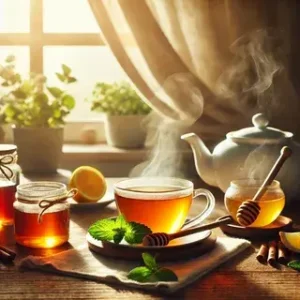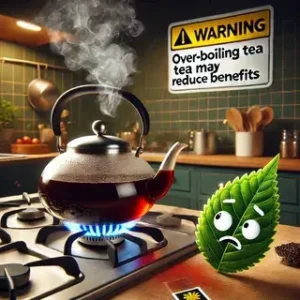Types of Tea: Through Flavors and 20 Health BenefitsAfter water, tea is the second most popular drink in the world. It is a famous and favorite drink, and of course, you would also like to enjoy its flavors. There are many types of tea, but all types are produced from the same plant except Antarctica. Tea is grown on every continent of the world. It is also beneficial for our health. In this blog, we will analyze the types of tea, their origin, taste, and health benefits.
1. Green Tea
As you know, there are many types of tea, but green tea is one of the most popular types. Green tea originates from China and Japan and is forced to cultivate at home. Green tea is very beneficial for health. It reduces the risk of cancer, increases our metabolism, increases fat burning, and leads to weight loss.
- Aromas: Fairly sweet, Grassy, fresh
- Health Benefits: Helps heart health, utilities in weight loss, improves brain function, Rich in antioxidants
2. Black Tea
People new to the world of tea are very familiar with black tea. Black tea has a dark color and intense flavor that sets it apart from other types of tea. Black tea undergoes complete fermentation. Black tea was first made in India and China. It has since become one of the most widely consumed teas in the world. Black tea offers many benefits, such as improving heart health, lowering blood pressure, reducing the risk of stroke, and weight loss. It is also a source of
- Flavors: Strong, malty, earthy, slightly astringent
- General Diversities: Assam, Darjeeling, Earl Grey, English Breakfast
3. White Tea
White tea shot has a delightful taste and contains vodka but is full of fruit flavor, perfect for summers, ready to sip and enjoy in minutes. White tea is not only a pretty drink but also a great friend in helping health and well-being
- Flavours: Light, sweet, delicate
- Popular Varieties: Silver Needle, White Peony, Long Life Eyebrow
4. Oolong Tea
As you know, all teas are the product of the same plant, but the process is called oolong tea. Oolong tea is also called traditional Chinese tea. It is made when the leaves are dried in the sun and slightly crushed to produce partial oxidation (1, 2Trusted Source, 3).
– Aromas: Bloomy, sweet, pleasant, and slightly misty
– Health Benefits: Boosts weight loss, cares for heart health, aids in breakdown
5. Herbal Tea
Herbal tea is made from herbs. It is not a proper tea because it is not obtained from the Camellia sinensis plant (used to make black, oolong, green, and white tea). There are varieties, each with its flavor qualities and health benefits. It is prepared from fruits and spices.
– Flavors: Varies widely depending on ingredients (e.g., minty, fruity, floral)
– Health Benefits: Calming effects, improves sleep, supports digestion, immune-boosting properties
– Popular Varieties: Chamomile, Peppermint, Hibiscus, Rooibos
6. Pu-erh Tea
Pu-erh originates from China’s western Yunnan Province, known as black tea in the Far East of the world, named after the market town where it was first produced in China’s Yunnan Province. People have been cultivating it for years.
– Flavors: Earthy, rich, smooth, slightly sweet
– Health Benefits: Promotes digestion, lowers cholesterol, aids in weight loss, detoxifying properties
– Popular Varieties: Sheng Pu-erh (raw), Shou Pu-erh (ripe)
7. Yellow Tea
As you know, teas are produced from the same plant, but yellow tea is one of the best types made from the camellia sinensis tea plant. Yellow tea is an expensive and rare type of tea. It is from China. It leaves and is known for its excellent taste. This yellow tea is also known as imperial tea. It has the same characteristics as green tea, but its taste differs from green tea’s.
- Flavors: Mellow, sweet, nutty, smooth
- Health Benefits: Rich in antioxidants, improves digestion, reduces inflammation
- Popular Varieties: Junshan Yinzhen, Meng Ding Huangya, Huoshan Huangya
How to Choose the Right Tea for You
As you know, many types of tea have unique properties; how do you choose the tea that suits your health and taste needs? Here’s an artless principle:
v For Weight Loss: Use green, oolong, or pu-erh tea.
v For Relaxation and Sleep, Go for herbal teas like chamomile or peppermint.
v For Heart Health: Black, green, and pu-erh tea are excellent choices.
v For a Delicate Flavor: Choose white tea or yellow tea.
Conclusion
It would not be very smart to call tea just a beverage because it is an experience that best exemplifies the flavors and health benefits. Whether you prefer the fresh, grassy notes of green tea or the robust, earthy flavors of black or pu-erh tea, there’s a tea out there for everyone. If you explore the different types, you will soon discover the best cup for your mood and health.
What are the main types of tea?
- Black, green, white, oolong, and herbal teas are among the many varieties of tea that people are frequently interested in, as well as how their tastes and health advantages vary.
Which tea is best for health?
- With an emphasis on antioxidants, weight loss, and immunity-boosting qualities, many people are curious about which tea has the greatest health advantages.
What are the flavor profiles of different teas?
- Tea lovers sometimes enquire about the distinctive flavors of teas, such as earthy, flowery, fruity, or smoky undertones.
How does tea improve overall health?
- Customers want to know how tea improves cardiovascular health, mental clarity, digestion, and inflammation reduction.
What is the nutritional value of tea?
- People often search for information on the vitamins, minerals, and calories in different kinds of tea.
Which teas are best for specific conditions?
- People frequently search for teas that are suggested for detoxification, stress reduction, or improved sleep.
What are the side effects of drinking too much tea?
- Potential drawbacks, like caffeine sensitivity or gastrointestinal distress, are frequently brought up.
1. How do the antioxidants in tea benefit your body?
By scavenging free radicals, tea’s antioxidants, like catechins and polyphenols, aid in the fight against oxidative stress. This action promotes a number of health advantages:
- Cardiovascular Health: Polyphenols found in green tea have been associated with lower levels of LDL cholesterol and better heart health.
- Cancer Prevention: According to some research, the antioxidants in white and green teas may lower the risk of developing some types of cancer by shielding cells from harm.
- Anti-Aging: Antioxidants in tea help slow down the effects of aging by lowering oxidative stress, which will lead to healthier skin and more vitality overall.
- Immune Boost: Tea’s flavonoids strengthen the body’s defenses against infections.
Regular tea consumption, combined with a balanced diet, is a natural way to incorporate these health-boosting compounds.
2. Which teas are best for stress relief and relaxation?
Certain teas contain compounds like L-theanine, which promote relaxation without sedation. Popular options include:
- Chamomile Tea: Known for its relaxing properties, camomile is frequently brewed as a tea before bed.
- Lavender Tea: With its calming scent, it helps lower anxiety and promote calmness.
- Peppermint Tea: Menthol, which is found in peppermint tea, relaxes muscles and gives off a chilly, revitalizing feeling.
- Green Tea: L-theanine, which is found in green tea, is believed to improve focus and lower stress.
- Valerian Root Tea: Often used to help people relax and fight sleeplessness.
These teas work best when consumed warm and in a peaceful setting, helping to amplify their stress-relieving benefits.
3. What are the caffeine levels in various teas, and how do they impact health?
Tea contains varying levels of caffeine, which can affect energy, alertness, and metabolism:
- Black Tea: With 40–70 mg of caffeine per cup, black tea is a great way to start the day.
- Green Tea: contains soothing L-theanine and has a moderate boost (20–45 mg per cup).
- White Tea: 15–30 mg per cup; ideal for caffeine-sensitive people.
- Herbal Teas: Usually caffeine-free, they are ideal for unwinding in the evening.
- Oolong Tea: 30–50 milligrams per cup, in between black and green tea.
Caffeine in moderation can enhance focus and metabolism but may cause jitteriness or sleep disruption if consumed excessively.
4. How can tea improve digestion?
Several teas have properties that aid in digestion:
- Peppermint Tea: Calms the digestive system and lessens cramps or bloating.
- Ginger Tea: Ginger tea is well-known for reducing nausea and promoting the activity of digestive enzymes.
- Fennel Tea: After large meals, fennel tea promotes good digestion and helps lower flatulence.
- Green Tea: Green tea’s polyphenols, which encourage good gut bacteria, help to maintain gut health.
- Pu-erh Tea: Pu-erh tea is a fermented tea that may help with digestion and metabolism.
These teas are most effective when consumed after meals and can be a natural remedy for digestive discomfort.
5. Can tea support weight loss?
Yes, several types of tea are associated with weight management:
- Green Tea: Catechins like EGCG, which are found in green tea, increase fat oxidation and metabolism.
- Oolong Tea: Increased fat burning and abdominal fat reduction are two benefits of oolong tea.
- Pu-erh Tea: It aids in the breakdown of lipids and is frequently drunk after meals.
- Herbal Teas (e.g., dandelion, ginger): Herbal teas (like ginger and dandelion) may help with digestion and water retention, which may help with weight loss in a roundabout way.
While tea can complement a weight-loss plan, it’s most effective when combined with a healthy diet and regular exercise.
6. What are the common side effects of drinking too much tea?
Excessive tea consumption may lead to:
- Caffeine Overload: resulting in elevated heart rate, restlessness, or insomnia.
- Iron Absorption Issues: Tea’s tannins can prevent iron from being absorbed, especially when it’s drunk with food.
- Stomach Irritation: Tea consumption on an empty stomach may result in nausea or acidity.
- Dependence on Caffeine: Tea may become a source of energy over time.
Moderation is key to enjoying tea without adverse effects. Experts recommend 3–4 cups daily for most individuals.
7. Which teas are best for boosting immunity?
Immunity-boosting teas contain compounds that enhance the body’s defenses:
- Green Tea: Catechins, which are abundant in green tea, have antiviral qualities.
- Elderberry Tea: Rich in antioxidants and vitamin C, it helps prevent colds.
- Turmeric Tea: Curcumin, a strong anti-inflammatory, is found in turmeric tea.
- Lemon Ginger Tea: Combines the immune-boosting qualities of ginger with vitamin C.
- Echinacea Tea: Well-liked for reducing the length of flu and colds.
8. What is the healthiest type of tea?
- Green Tea often tops the list due to its high antioxidant content, particularly epigallocatechin gallate (EGCG), which supports heart health, brain function, and weight loss.
- White Tea is also highly praised for its minimal processing and rich antioxidants.
- Herbal teas like chamomile (for relaxation) and peppermint (for digestion) have unique health benefits.
9. Which types of tea are good for digestion?
- Peppermint Tea: Eases bloating and indigestion.
- Ginger Tea: Stimulates digestive enzymes, reducing nausea.
- Chamomile Tea: Soothes the stomach and helps with acid reflux.
- Fennel Tea: Helps with gas and bloating.
10. What is oolong tea?
Oolong tea is a semi-oxidized tea, falling between green and black tea in flavor and oxidation. It is known for its complex taste, which can range from floral to nutty and is often praised for boosting metabolism and promoting weight loss.
11. What makes green tea different from black tea?
- Processing: Green tea is not oxidized, while black tea undergoes full oxidation.
- Flavor: Green tea is light and fresh; black tea is bold and malty.
- Caffeine: Black tea has more caffeine than green tea.
- Health Benefits: Green tea has higher catechins, while black tea is rich in theaflavins.
12. Are there any caffeine-free types of tea?
- Herbal teas like rooibos, chamomile, hibiscus, and peppermint are naturally caffeine-free.
- Decaffeinated versions of traditional teas are also available but may lose some antioxidants during processing.
13. Which tea is good for weight loss?
- Green Tea: Rich in catechins that boost metabolism.
- Oolong Tea: This may aid fat burning due to its polyphenols.
- Pu-erh Tea: Believed to help reduce fat absorption.
14. Can herbal tea help with sleep?
Yes, herbal teas like chamomile, lavender, and valerian root tea are renowned for promoting relaxation and improving sleep quality. They contain compounds that calm the nervous system.
15. What is the difference between white tea and green tea?
- Processing: White tea is less processed than green tea.
- Flavor: White tea has a lighter, more delicate flavor, while green tea has a more robust, grassy taste.
- Antioxidants: White tea often retains more antioxidants due to minimal processing.
16. What tea is best for iced tea?
- Black Tea: Strong flavors like Ceylon or Assam make great bases for iced tea.
- Green Tea: Refreshing and light, often paired with citrus or mint.
- Herbal Tea: Hibiscus or rooibos adds a fruity twist to iced beverages.




